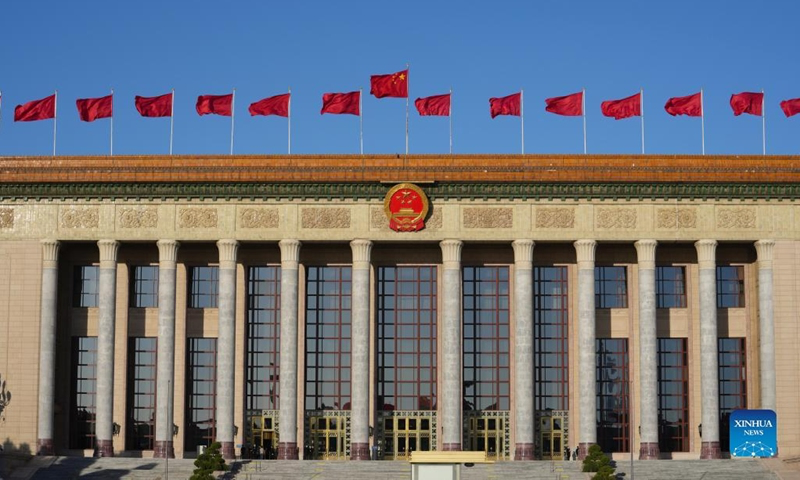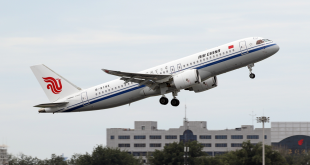Published: April 23,2023
By Yang Sheng

Photo taken on March 5, 2022 shows a view of the Great Hall of the People in Beijing, capital of China. The fifth session of the 13th National people’s Congress (NPC) will hold its opening meeting on March 5 at the Great Hall of the People in Beijing.(Photo: Xinhua)
China has pressed the “accelerator” button, said Chinese State Councilor and Foreign Minister Qin Gang on the sideline of the “two sessions” in March,and it seems that in the first quarter of 2023, China’s diplomacy has already had a “global effect,” said experts.
This trend has continued the momentum. This week, China received visits from Gabonese President Ali Bongo Ondimba, Laotian Deputy Prime Minister and Foreign Minister Saleumxay Kommasith and Uruguayan Foreign Minister Francisco BustilloBonasso.
Since the beginning of 2023, leaders and senior officials from more than 20 countries and international organizations, whether they are major powers like Russia, France, the EU and Brazil, or small nations from Africa and Oceania, and even countries like Saudi Arabia and Iran that were previously hostile to each other, have had frequent interactions with China to seek solutions to ease tensions, opportunity for development, and certainty for growth, said analysts.
Apart from receiving foreign leaders, the Chinese Foreign Ministry has also held events to actively introduce and share China’s ideas, views and wisdom for global issues. Wang Wenbin, a spokesperson of the Chinese Foreign Ministry, announced on Thursday that the Lanting Forum on “Chinese Modernization and the World” will be held at the Grand Halls in Shanghai on Friday. State Councilor and Foreign Minister Qin Gang will attend the opening ceremony of the forum and deliver a keynote speech.
The forum is expected to host foreign dignitaries, renowned experts and scholars, business leaders, foreign diplomatic envoys and representatives of international organizations in China and representatives from international media, Wang said. Under the theme of “Chinese Modernization and the World,” the forum consists of three panel sessions and a luncheon with the business community for in-depth exchanges on topics including China’s new development, better global governance, closer people-to-people exchanges and pursuing high-standard opening up, Wang said.
China is providing and contributing what most members of the international community desperately need at a time of global turbulence, and China is also boosting connections with the world by continuing to sincerely promote its reform and opening-up, actively improve international environment that benefits both Chinese modernization and the world’s need for peace and recovery, said experts. This is why China is becoming increasingly popular at present, despite containment and stigmatization campaign from the US, they noted.
Meeting world’s demands
The world has suffered from the COVID-19 pandemic over the past three years, and also from a series of secondary effects caused by the Ukraine crisis since 2022. As a result, “peace and stability, de-escalation of existing crises, opportunity for development, and certainty for recovery, as well as investment and advanced technologies” are the most needed “goods” for all countries around the globe, said Li Haidong, a professor at the Institute of International Relations at the China Foreign Affairs University.
Only major powers with considerable national strength are able to provide these needed “goods”, but unfortunately, the US – the only super power in the world – is not interested in providing these, and Washington and its allies are even further undermining the precious peace and certainties, experts said.
When the world asks for peace, the US is adding fuel to the fire to keep the Ukraine crisis burning and is also hyping up tensions in the Taiwan Straits, the Korean Peninsula and the Middle East; when the world asks for opportunity and recovery, Washington forces other countries to take sides and decouple from its competitors and bans its people from using other countries’ advanced products and APPs; when the world asks for certainty, the US disrupts the stability of international supply and industrial chains through unilateral sanctions, and its failure to handle inflation only exacerbates the world’s concerns, analysts noted.
All of these make the world more desperately need these “goods,” and when China can provide these very “goods,” China will very naturally be welcomed, experts noted. For Saudi Arabia and Iran, China provides mediation; for Russia, Ukraine and the EU, China provides markets, multilateralism, and hope of peace; for countries worldwide that ask for recovery, development and security, China provides opportunities with the Belt and Road Initiative, technologies, investment and experience, as well as the internationalization of the RMB to jointly form an alternative international payment system, experts said.
“This means China’s development advances with the trend of our time, and is welcomed by the majority of the world, and what the US has done in past decades and the world order dominated by its hegemony has brought enough pain to the world, and doesn’t go along with the trend of the times,” Li told the Global Times on Thursday.
When the world is in turbulence, it’s very reasonable for the majority of the international community to expect a major power to play the role of “stabilizer” and “mainstay,” and now, “they see that hope from China,” Li noted.
Zheng Yongnian, professor at the Chinese University of Hong Kong (Shenzhen), and president of the Institute for International Affairs, Qianhai, said at a forum in Shenzhen on Thursday, “I learnt from many foreigners that they don’t want China to become another US or another Russia, they hope for China to be itself.”
“China will not build a world with China at its core, as what we need is real multilateralism, or ‘inclusive multilateralism’ in academic terms, which is totally different from the exclusive kind upheld by the US,” Zheng noted.
Priority for diplomacy
In stark contrast to the heating global effect brought about by China’s accelerated diplomatic drive, Washington has received very few visits from foreign leaders this year. And as China has received leaders or senior officials from many countries, it seems like the US, which failed to send senior officials to visit, has been “marginalized” or “isolated” by the international community, said experts.
“This makes the US even more anxious and nervous as it finds that China is giving everyone a big hug and getting more and more popular, but gives the cold shoulder to the US,” Jin Canrong, associate dean of the School of International Studies at the RenminUniversity of China, told the Global Times on Thursday.
Jin said, “China has never closed its door to the US. Originally, China scheduled a visit by US Secretary of State Antony Blinken earlier this year, but it was ruined by the nonsensical ‘spy balloon’ incident, and Washington’s officials can’t blame anyone but themselves.”
Zheng said that many people are pessimistic because of China-US tensions, “but I think we should keep calm” because China’s relations with other countries and organizations are also important, such as its ties with the EU and ASEAN.
Jin echoed that view, saying “we can see from the diplomatic activities that have taken place in recent months that China, as well as Chinese leaders and diplomats, have been very busy. Yes, we are open for dialogue with the US, but Washington should better understand that resuming dialogue with senior US officials is not a priority for China’s diplomacy.”
In addition, China has painful memories of being too friendly to the US, Jin said. “Sometimes in the past, we treated US officials nicely, and they made a lot of nice promises, but after they returned to their countries, they completely changed their attitudes and kept being provocative and aggressive against China. This is why the Chinese side said recently that the US needs to show concrete sincerity.”
Jin said the China-US talks will be resumed sooner or later, but the US needs to be patient and wait, as China has a busy schedule and the US is not priority on the list. In order to resume talks, US officials should be mindful of their attitude. “They should know that they are the ones asking for talks, and it’s not China that is begging them to come,” he said.
globaltimes.cn
 Africa -China Review Africa -China Cooperation and Transformation
Africa -China Review Africa -China Cooperation and Transformation
